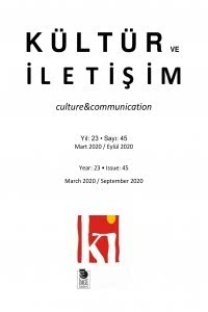Göndergesiz Nostalji: Günümüzde FotoŞrafik şmge
Bu çalışma, fotoŞrafın doŞası gereŞi bir nostalji nosyonuyla işlediŞi ve bu nosyonun Roland Barthes'ın "göndergenin ayrılmazlıŞı (baŞlılıŞı)" olarak adlandırdıŞı şeye dayandıŞı varsayımına dayanmaktadır. Yazar dijital imgelerin "gönderge" ile ilişkisi baŞlamında ontolojisine odaklanarak bir zamanlar fotoŞrafa içkin olan nostalji nosyonunun fotoŞrafta dijital dönüşüm denilen olgu ile birlikte kökten bir biçimde dönüştüŞünü iddia etmektedir. Dijital imgelerin estetiŞi de bu yeni nostalji "kipini" teyit etmektedir: Dijital imgeler bir yandan mükemmelik ve pürüzsüzlüŞü görülebilecek herşeyi görme arzusu ile birleştirirken, aynı zamanda, paradoksal bir biçimde, analog benzeri imgeler üretmek için "doku" ve "kusur" nosyonlarıyla işlemektedirler. Bu makalede bu iki farklı ancak birbirleriyle ilişkili temsil formunun, kendi nesnesini bilinçli olarak yok eden bir postmodern (ironik) nostalji ve Lev Manovich'ten (2006) esinlenerek "fotografik" olanın pekiştirilmesi ve yüceltilmesi ile işleyen iki farklı alana tekabül ettiŞini iddia edeceğim.
Nostalgia without the Referent: The Photographic Image Now
This article rests on the assumption that photography operates inherently through a notion of nostalgia, which in turn depends on what Roland Barthes calls the “adherence of the referent.” The author focuses on the ontology of digital images with respect to their relation to the “referent” and claims that the nostalgia once immanent to the photograph has been fundamentally changed by the so-called digital turn in photography. The aesthetics of digital images confirm the existence of this new “mode” of nostalgia: while the digital images marry perfection and tactlessness with a desire to behold everything possible, they also, somewhat paradoxically, operate through “texture” and “defect” to generate analog-like images. I will argue that these two different but interrelated forms of representation correspond to two distinct realms: a postmodern (ironic) nostalgia that consciously withers its object and, via inspiration from Lev Manovich (2006), solidification and glorification of the “photographic.”
___
- Barthes, Roland (1981). Camera Lucida: Reflections on Photography. Çev., Richard Howard. New York: Hill and Wang.
- Barthes, Roland (1977). Image, Music, Text, Çev., Stephen Heath. London: Fontana Press.
- Benjamin, Walter (2007). Illuminations. Çev., Harry Zohn. New York: Schocken Books.
- Boym, Svetlena (2001). The Future of Nostalgia. New York: Basic Books. Bull, Stephen (2009). Photography. New York: Routledge.
- Crary, Jonathan (1992). Techniques of the Observer: On Vision and Modernity in the Nineteenth Century. Cambridge, MA: MIT Press.
- DeŞirmenci, Koray (2010). “Photographic Images in the Digital Age: Does Photography Still Exist?” In The Aesthetic Dimension Of Visual Culture.
- Ondrej Dadejik ve Jakub Stejskal (der.) içinde. Newcastle upon Tyne: Cambridge Scholars Publishing. 146-154.
- Edwards, Elizabeth ve Janice Hart (2004). Photographs Objects Histories: On the Materiality of Images. New York: Routledge.
- Gooskens, Geert (2011). “The Digital Challenge: Photographic Realism Revisited.” Proceedings of the European Society for Aesthetics (3): 115-125.
- Graf, Alexander (2002).The Cinema of Wim Wenders. London: Wallflower Press.
- Jäger, Gottfried (2003). “Abstract Photography.” In Rethinking Photography I+II: Narration and New Reduction in Photography, Ruth Horak (der.) içinde. Salzburg: Fotohof Edition. 162-195.
- Jameson, Fredric (1985). “Postmodernism and Consumer Society.” In Postmodern Culture. Hal Foster (der.) içinde. London: Pluto Press. 111-125.
- Jameson, Fredric (1984). “Postmodernism, or the Cultural Logic of Late Capitalism.” New Left Review (146) : 59-92.
- Lowenthal, David (2003). The Past is a Foreign Country. Cambridge: Cambridge University Press.
- MacCabe, Colin (1997). “Barthes and Bazin: The Ontology of the Image.” In Writing the Image After Roland Barthes. Jean-Michel Rabaté (der.) içinde. Philadelphia: University of Pennsylvania Press. 71-76.
- Manovich, Lev (2006). “The Paradoxes of Digital Photography.” In The Photography Reader. Liz Wells (der.) içinde London: Routledge. 240-249 . Mitchell, William J (1992). The Reconfigured Eye: Visual Truth in the PostPhotographic Era. Cambridge, MA: MIT Press.
- Nöth, Winfried (2007). “The Death of Photography in Self-Reference.” In SelfReference in the Media. Winfried Nöth ve Nina Bishara (der.) içinde. New York ve Berlin: Mouton de Gruyter. 95-106.
- Nöth, Winfried (2003). “Photography between Reference and Self-reference.” In Rethinking Photography I+II: Narration and New Reduction in Photography. Ruth Horak (der.) içinde. Salzburg: Fotohof Edition. 22-39.
- Peirce, Charles Sanders (1955). Philosophical Writings of Peirce. Justus Buchler (der.). Mineola, NY: Dover Publications.
- Proust, Marcel (1998). Swann’s Way: In Search of Lost Time. Çev., Dennis Joseph Enright. New York: Modern Library.
- Robins, Kevin (1995). “Will Image Move us Still?” In The Photographic Image in Digital Cuture. Martin Lister (der.) içinde. New York, NY: Routledge. 29-50.
- Rosen, George (1975). “Nostalgia: A ‘Forgotten’ Psychological Disorder.” Clio Medica 10(1): 29-51.
- Sontag, Susan (1977). On Photography. New York: Penguin.
- Starobinski, Jean (1966). “The Idea of Nostalgia.” Çev., William S. Kemp. Diogenes (54): 81-103.
- Tagg, John (1988). The Burden of Representation: Essays on Photographies and Histories. London: Macmillan.
- Wawrzycka, Jolanta (1997). “Photographeme: Mythologizing in Camera Lucida.”
- In Writing the Image After Roland Barthes. Jean-Michel Rabate (der.) içinde. Philadelpia: University of Pennsylvania Press. 90-98.
- ISSN: 1301-7241
- Yayın Aralığı: Yılda 2 Sayı
- Başlangıç: 1998
- Yayıncı: İmge Kitabevi Yayınları
Sayıdaki Diğer Makaleler
Göndergesiz Nostalji: Günümüzde FotoŞrafik şmge
Ekrandaki “Öteki”: 2000 Sonrası Yerli Dizilerde Azınlıkların Temsili
Senem Sönmez SELÇUK, Ürün Yıldıran ÖNK
Küresel Medya Formatlarının Temel Aktörleri
FotoŞraf Sahaya şniyor, Özdüşünümsellik Yükseliyor
Ulusaşırı şslam ve Milliyetçilik: Bir Sosyal-CoŞrafi Tahayyül Olarak Köln Merkez Camii
Direnen FotoŞraflar: Türkiye’de Toplumsal BelleŞin şkonlaşmış şmgeleri
Internet Arama Motorları ve Kamusal Alan Arama Motorları Kimin İçin Çalışıyor.?
